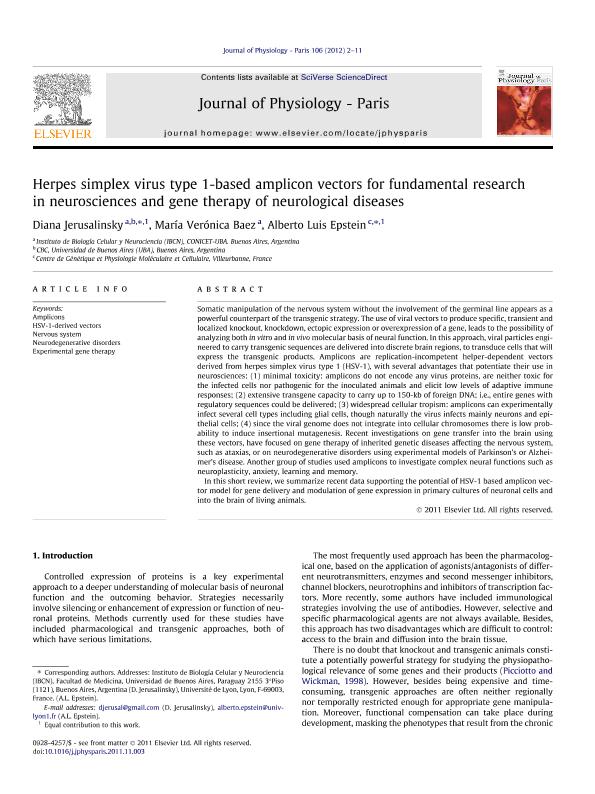Artículo
Herpes simplex virus type 1-based amplicon vectors for fundamental research in neurosciences and gene therapy of neurological diseases
Fecha de publicación:
01/2012
Editorial:
Elsevier
Revista:
Journal of Physiology
ISSN:
0928-4257
Idioma:
Inglés
Tipo de recurso:
Artículo publicado
Clasificación temática:
Resumen
Somatic manipulation of the nervous system without the involvement of the germinal line appears as a powerful counterpart of the transgenic strategy. The use of viral vectors to produce specific, transient and localized knockout, knockdown, ectopic expression or overexpression of a gene, leads to the possibility of analyzing both in vitro and in vivo molecular basis of neural function. In this approach, viral particles engineered to carry transgenic sequences are delivered into discrete brain regions, to transduce cells that will express the transgenic products. Amplicons are replication-incompetent helper-dependent vectors derived from herpes simplex virus type 1 (HSV-1), with several advantages that potentiate their use in neurosciences: (1) minimal toxicity: amplicons do not encode any virus proteins, are neither toxic for the infected cells nor pathogenic for the inoculated animals and elicit low levels of adaptive immune responses; (2) extensive transgene capacity to carry up to 150-kb of foreign DNA; i.e., entire genes with regulatory sequences could be delivered; (3) widespread cellular tropism: amplicons can experimentally infect several cell types including glial cells, though naturally the virus infects mainly neurons and epithelial cells; (4) since the viral genome does not integrate into cellular chromosomes there is low probability to induce insertional mutagenesis. Recent investigations on gene transfer into the brain using these vectors, have focused on gene therapy of inherited genetic diseases affecting the nervous system, such as ataxias, or on neurodegenerative disorders using experimental models of Parkinson's or Alzheimer's disease. Another group of studies used amplicons to investigate complex neural functions such as neuroplasticity, anxiety, learning and memory. In this short review, we summarize recent data supporting the potential of HSV-1 based amplicon vector model for gene delivery and modulation of gene expression in primary cultures of neuronal cells and into the brain of living animals.
Archivos asociados
Licencia
Identificadores
Colecciones
Articulos(IBCN)
Articulos de INST.DE BIOLO.CEL.Y NEURCS."PROF.E.DE ROBERTIS"
Articulos de INST.DE BIOLO.CEL.Y NEURCS."PROF.E.DE ROBERTIS"
Articulos(OCA HOUSSAY)
Articulos de OFICINA DE COORDINACION ADMINISTRATIVA HOUSSAY
Articulos de OFICINA DE COORDINACION ADMINISTRATIVA HOUSSAY
Citación
Jerusalinsky, Diana Alicia; Baez, Maria Veronica; Epstein, Alberto Luis; Herpes simplex virus type 1-based amplicon vectors for fundamental research in neurosciences and gene therapy of neurological diseases; Elsevier; Journal of Physiology; 106; 1-2; 1-2012; 2-11
Compartir
Altmétricas




